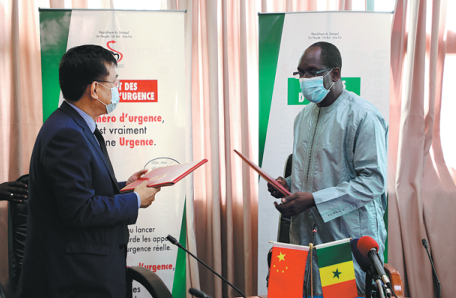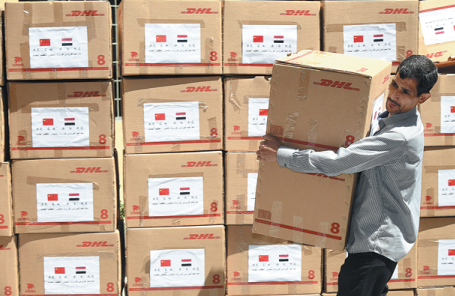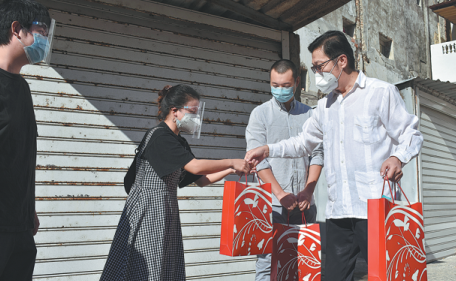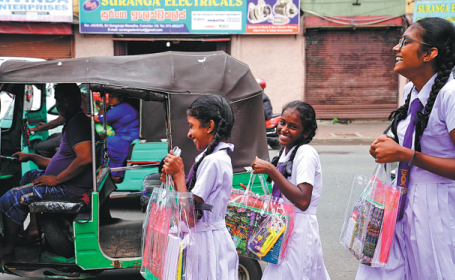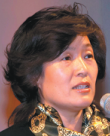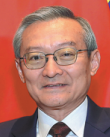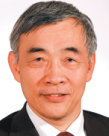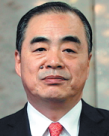DEDICATED DIPLOMATS EXCEL OVERSEAS DURING PANDEMIC
Envoys strengthen efforts to defeat COVID-19
Many Chinese diplomats working overseas have had to reduce or cancel business trips back home due to the pandemic.
Instead, they have remained at their posts to bolster the fight against the outbreak and maintain cooperation and exchanges with other countries.
Four senior diplomats were unable to return to China to attend the two sessions this year in their capacity as the country's senior political advisers.
The quartet are Chinese ambassador to Japan Kong Xuanyou, UNESCO Deputy Director-General Qu Xing, China's Permanent Representative to the European Union Zhang Ming and Chinese Ambassador to Greece Zhang Qiyue.
The COVID-19 pandemic meant they could not attend in-person the annual gathering of the 45-strong subgroup of the 13th National Committee of the Chinese People's Political Consultative Conference.
This group, which comprises professional figures such as diplomats, trade officials and think tank scholars, focuses on offering policy advice for foreign affairs and friendly exchanges with nations worldwide.
On March 4, a special message to the four diplomats was projected on a video screen during the group's preparatory meeting, according to the CPPCC National Committee's official newspaper issued the following day.
The message stated, "As we gather in Beijing to perform our duties and discuss national affairs, we would like to extend great respect and sincere greetings to you as you stay committed to your posts overseas and strive to serve the motherland's interests as well as the global fight against the pandemic."
It was signed by the group's members who attended the physical meeting, according to one of them, Han Fangming, president of the Charhar Institute, an international relations think tank.
"Last year, they (the diplomats) were unable to return home to attend the two sessions (in May), as due to the impact of the pandemic, they had to continue serving international organizations or working on behalf of the country," Han said.
This year, some members of the group proposed sending the message to the four, and the suggestion received unanimous agreement.
After Han told Qu Xing, the UNESCO deputy director-general, about the message through WeChat, Qu said he was thrilled to learn about it and was sorry he could not attend the meeting in-person this year.
Qu, a veteran researcher of foreign affairs, was appointed China's ambassador to Belgium in 2014, before becoming a deputy head of UNESCO four years later.
He said he hoped the pandemic could be controlled as soon as possible so that he could attend the two sessions next year.
Han said, "It is not only the wish of Mr Qu, but also of our entire group to witness the return of the four members to the two sessions next year and to see daily life worldwide getting back to normal."
According to State Councilor and Foreign Minister Wang Yi, over the past year, "the most demanding "task on the diplomatic front has been the battle against COVID-19, with Chinese diplomats doing their utmost to enable the domestic response and joining with the rest of the world in the fight.
They carried out "the largest emergency humanitarian operations since the founding of the People's Republic of China" and played their role in the country's contribution to the global response, Wang told reporters on March 7.
Speaking about the major tasks for Chinese diplomats this year, Wang said they would further promote international cooperation against COVID-19, advance cooperation on the Belt and Road Initiative, facilitate an early recovery for the world economy, and strengthen the global response to challenges such as climate change.
Serving citizens
The pandemic has also resulted in dramatic changes to the tasks performed by Chinese diplomats over the past 12 months.
They have spent more time offering diplomatic protection to Chinese citizens, handling applications for health certificates for travel to China, and worked at the forefront in coordinating operations and supplies to fight the pandemic.
Wang said that over the past year great concern had been voiced for the safety of Chinese nationals abroad.
"In the face of COVID-19, we provided timely assistance to Chinese nationals overseas and did whatever we could to protect and help them," he added.
Kong, the Chinese ambassador to Japan and a member of the CPPCC National Committee, followed the two sessions in real time through various channels in Tokyo every day while also carrying out his diplomatic duties.
He said, "The entire staff at the embassy will continue to stay in their posts to provide more help to Chinese citizens in Japan and stand with them during this hard time."
Kong said in an interview with Chinese media on March 10 that as the pandemic spread rapidly in Japan last year, the embassy worked to charter flights home for stranded citizens and to provide medicine to those in dire need.
It later shifted its focus to "paying more attention to the health and safety of overseas Chinese and personnel at China's institutions based in Japan", he said.
Embassy personnel have held seminars to improve safety awareness, organized mutual support groups among citizens, coordinated medical resources and distributed personal protective equipment, including 350,000 face masks, Kong added.
A flurry of comments and messages from Chinese netizens mourning ambassador Xu Hong, who led the Chinese embassy in the Netherlands during the height of the pandemic and into the middle of last year, bear testimony to the hard work performed by the country's diplomats.
Xu, a senior expert in international law and former head of the Foreign Ministry's Department of Treaty and Law, died from an illness on March 7.
WeChat user "Xiaoxiami" contributed to the embassy's obituary to Xu, stating, "Last year, because of the pandemic, I was very worried about my son, who was studying in the Netherlands, and I kept track of any releases from the embassy every day.
"Ambassador Xu Hong and the embassy staffers taking great care of Chinese nationals and students in the Netherlands made us feel warm and safe."
Another WeChat user recalled a letter written by the ambassador last year that was included in the health packs delivered by Chinese embassies and consulates in various countries to citizens badly in need of help to avoid infection. The packs mostly include face masks and sanitizers.
Diplomats from China based overseas worked day and night to organize protective gear, handle the health packs, tackle shipments and coordinate aid distribution with local Chinese communities, business chambers and student groups.
During Spring Festival last month, Chinese diplomatic missions distributed special editions of the health packs.
The contents of some packs included handwritten greetings cards in envelopes decorated with hand-drawn flowers, boxes of cultural and creative products, daily necessities and traditional Spring Festival cuisine.
As of March 1, some 500,000 Spring Festival packs had been delivered by 244 Chinese diplomatic missions in 163 countries, according to Foreign Ministry spokesman Zhao Lijian.
"The Spring Festival packs, which traveled long distances, delivered anti-epidemic materials, solicitude, warmth and sincere holiday wishes from the motherland to our compatriots overseas," Zhao told reporters earlier this month.
During a video conference last month to greet diplomats based overseas, Wang, the foreign minister, praised them for working hard in all parts of the world, confronting various difficulties, keeping their spirits high and sacrificing family life for their work.
The virus was still spreading, and unremitting efforts should be made to "win the fight against the pandemic and usher in a bright spring and a bright future by surviving this difficult winter", Wang added.
Efforts continue
The pandemic has failed to halt China's diplomatic efforts.
In January, Wang paid official visits to countries in Africa and Southeast Asia.
This week, he and Yang Jiechi, a member of the Political Bureau of the Communist Party of China Central Committee and director of the Office of the Foreign Affairs Commission of the CPC Central Committee, will head to Anchorage, Alaska, for a high-level strategic dialogue with the United States.
Despite the pandemic, many newly appointed diplomats have taken up their posts overseas.
The risk of infection has failed to deter Chinese envoys based abroad. They have continued to reach out to leaders and officials in-person or by video link to keep bilateral ties and cooperation afloat.
Yu Dunhai, China's new top envoy to Malta, was among seven new ambassadors appointed by President Xi Jinping in January.
On arrival in the Mediterranean island nation, Yu embarked on a busy schedule, visiting parliamentary leaders, figures involved in friendly exchanges, envoys from other countries and cultural exchange sites.
Similarly, since Jan 1, Zhang Qiyue, the Chinese ambassador to Greece and a member of the CPPCC National Committee, has met in-person or via video link with leading local figures, including ministers, a tourism organization chief, a governor and a university president.
During a face-to-face meeting between Zhang Qiyue and Greek Minister of Culture and Sports Lina Mendoni in January, the two talked about preparations for holding the China-Greece Year of Culture and Tourism this year to bolster understanding and exchanges between people from the two countries.
Last month, in a meeting with Greek Minister of Environment and Energy Kostas Skrekas, Zhang Qiyue noted that more Chinese enterprises are willing to invest in Greece to jointly promote its economic recovery and green development. She asked the Greek government to provide a good investment environment for these enterprises.
"China has a super-large-scale market, and its domestic demand potential will be fully unleashed to create more demand for the world. China's lasting development and opening-up will inject strong momentum into the recovery and growth of the world economy," she said.
Busy agendas
In advancing regular cooperation and tackling long-standing challenges, Chinese diplomats have had to handle the direct impact and spillover effects of the pandemic to their agendas.
For Zhang Ming, China's top envoy to the EU and also a member of the CPPCC National Committee, the wide range of his work agenda since the pandemic emerged is best illustrated by the long lists of questions posed to him by local media and think tanks.
Two of his most recent dialogues with European scholars and reporters shed light on how the pandemic has dramatically reshaped agendas for China and its diplomats.
In an interview with leading Portuguese media outlets in January, Zhang Ming answered questions on the potential rise of protectionism in Europe due to increasing trade frictions during the pandemic and also about Beijing's plan to attract more European investors into the Chinese market amid a global recovery.
He was asked about issues such as calls for a reduction in the EU's reliance on China for medical supplies, and the trilateral relationship involving China, the EU and the US.
In addition, he addressed regular topics such as the China-EU investment agreement and concerns about China's 5G technologies.
Zhang Ming also dealt with key issues during a dialogue with Dharmendra Kanani, director for Asia, peace, security, defense and digital for the think tank Friends of Europe.
He was questioned about hardened European sentiment and views toward China, speculation about a new China-US Cold War, cooperation with Central and Eastern European countries, China's post-pandemic economic recovery plan and cooperation on vaccines.
"This year, we expect to see a turning point in the global COVID-19 response, economic recovery and multilateral cooperation. China-EU relations are embracing more opportunities," Zhang Ming said in an interview with CGTN on March 2 when discussing his vision for China-EU ties.
He urged the global community to secure distribution of COVID-19 vaccines to developing countries.
"In the global response to COVID-19, the 'wooden barrel effect' applies, namely, our efforts are only as strong as the weakest link. There will be no lasting safety for all until every country or individual is safe," he said.
zhangyunbi@chinadaily.com.cn

